It’s amazing how far some cars go to reach their buyers. Think about it: If you live in New York and buy a car made in Japan, it’ll have made it across the Pacific, through the Panama canal, up the Eastern seaboard to you, pretty much unharmed. As you can probably expect, some measures are put in place to reduce the likelihood of damage during shipping, but one that’s often overlooked is the use of shipping blocks. They’re rarely thought about, supposed to be discarded, but can really leave you checking your fillings if someone forgets to throw them in the bin.
Once a car rolls out of the factory, it begins its journey to a dealer, usually involving transporters at the minimum, but sometimes going on ships and trains as well. Unsurprisingly, all of these methods of transportation require a certain amount of ground clearance, and sometimes cars need a little help maintaining their approach angle. That’s where “transport blocks,” or “shipping blocks,” or “shipping pucks” come in. They slot either into the front coil springs or around the shaft of the dampers, reducing jounce and ensuring that one or both ends of a vehicle are just high enough to prevent scraping when being loaded and unloaded in transport.
Normally, dealerships are expected to remove these transport blocks as part of the normal pre-delivery inspection process, but sometimes that just doesn’t happen. Actually, this oversight is less rare than you’d expect. You could be driving around with transport blocks still installed on your car and simply not know.
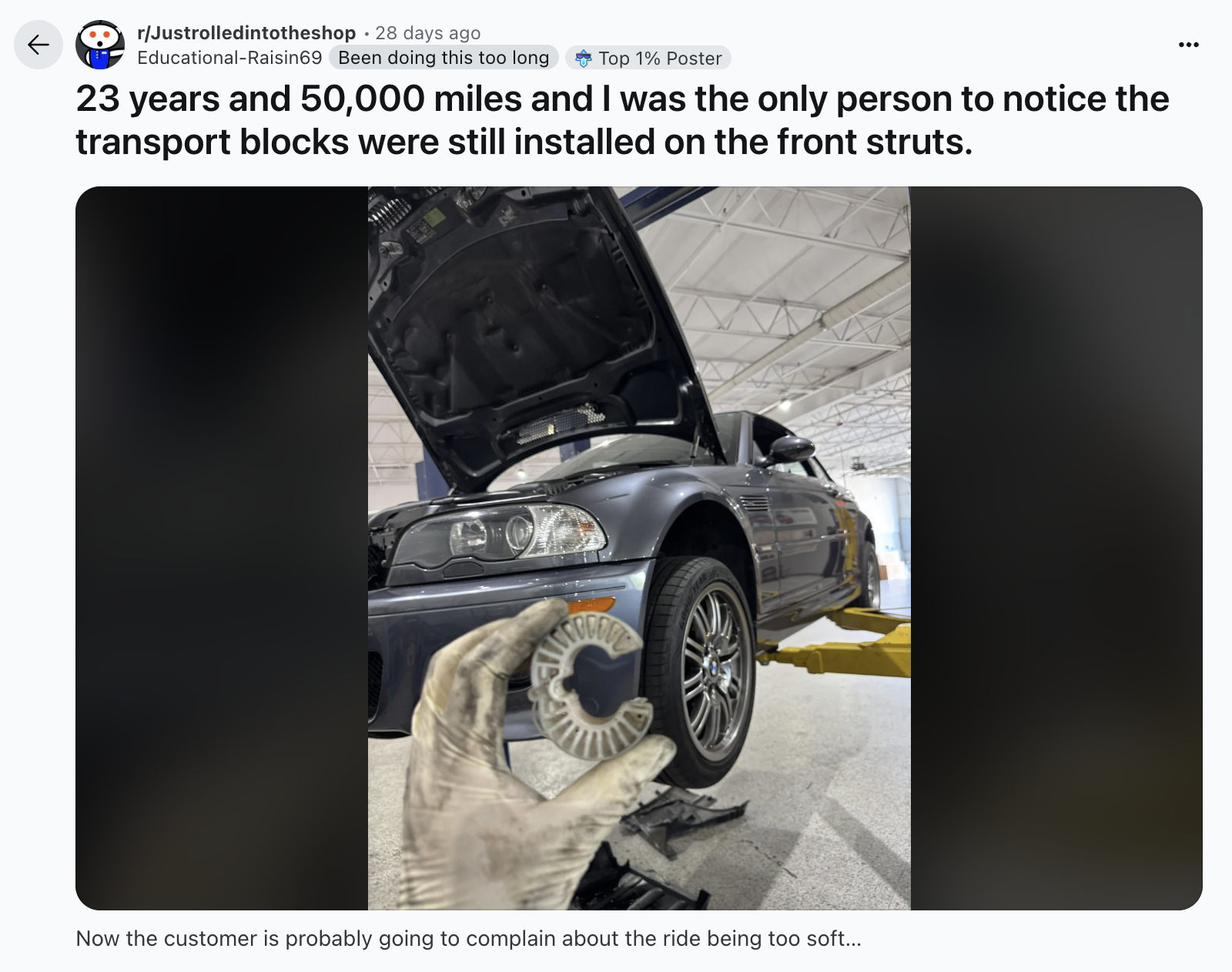
A technician working on an E46 BMW M3 posted on Reddit last month, writing “23 years and 50,000 miles and I was the only person to notice the transport blocks were still installed on the front struts.” Sure enough, the post features a great photo of a rather aged transport block held up in front of an M3.
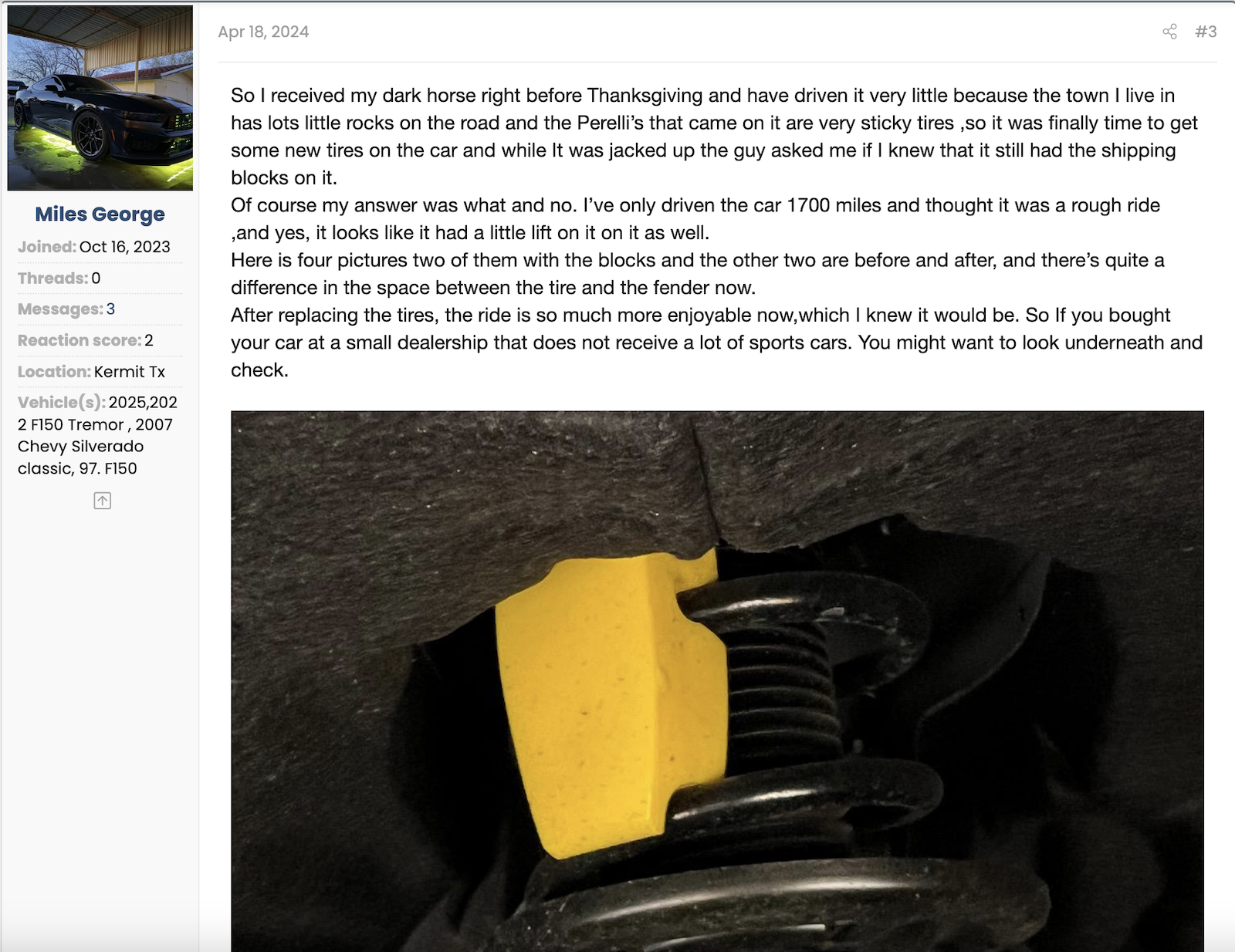
Likewise, there’s a whole thread on the Mustang 7G forum on which various owners have detailed the experience of having their delivery dealers forget to remove the shipping blocks. As one Dark Horse owner wrote:
So I received my dark horse right before Thanksgiving and have driven it very little because the town I live in has lots little rocks on the road and the Perelli’s [sic] that came on it are very sticky tires ,so it was finally time to get some new tires on the car and while It was jacked up the guy asked me if I knew that it still had the shipping blocks on it.
You’d think that bright yellow spring spacers would be hard to miss once you put a vehicle up on a lift, but the number of owners reporting taking delivery with these blocks still in point towards it being a thing to keep an eye out for.
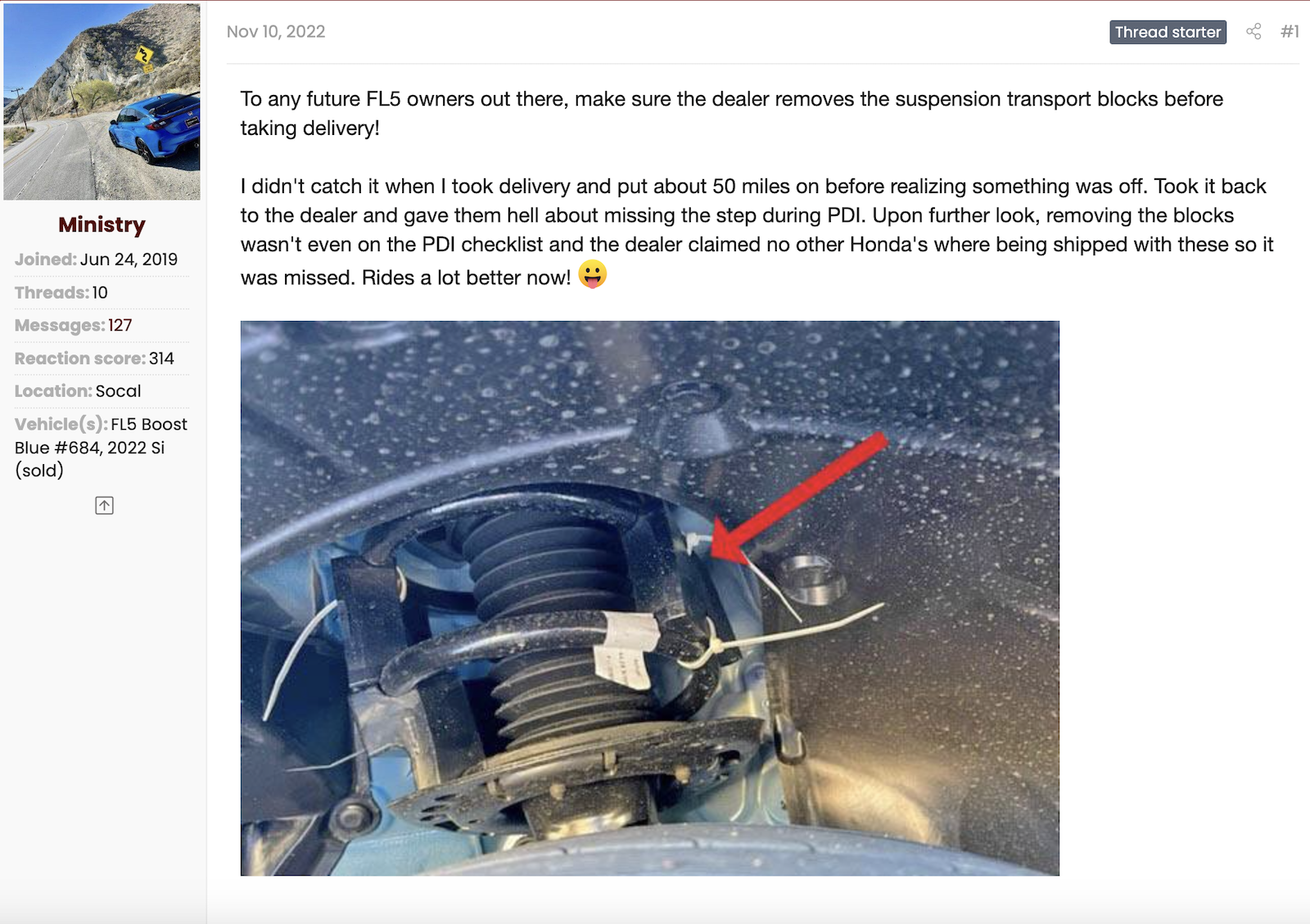
Unsurprisingly, transport blocks being left in place is also a problem on the current Honda Civic Type R. Owners on the CivicXI forum report finding the rubber blocks still cable-tied in their springs after taking delivery. As one owner wrote:
I didn’t catch it when I took delivery and put about 50 miles on before realizing something was off. Took it back to the dealer and gave them hell about missing the step during PDI. Upon further look, removing the blocks wasn’t even on the PDI checklist and the dealer claimed no other Honda’s where being shipped with these so it was missed. Rides a lot better now!
While transport blocks are most common on low-slung performance cars, they’ve historically been used on regular cars too. Many BMWs use them as part of a safe journey across the Atlantic, and unsurprisingly, owners of normal 3 Series sports sedans from before they were made in Mexico reported blocks being left in their vehicles. Here’s one thread from Bimmerpost that shows a solid image of these blocks in place on the rear dampers.
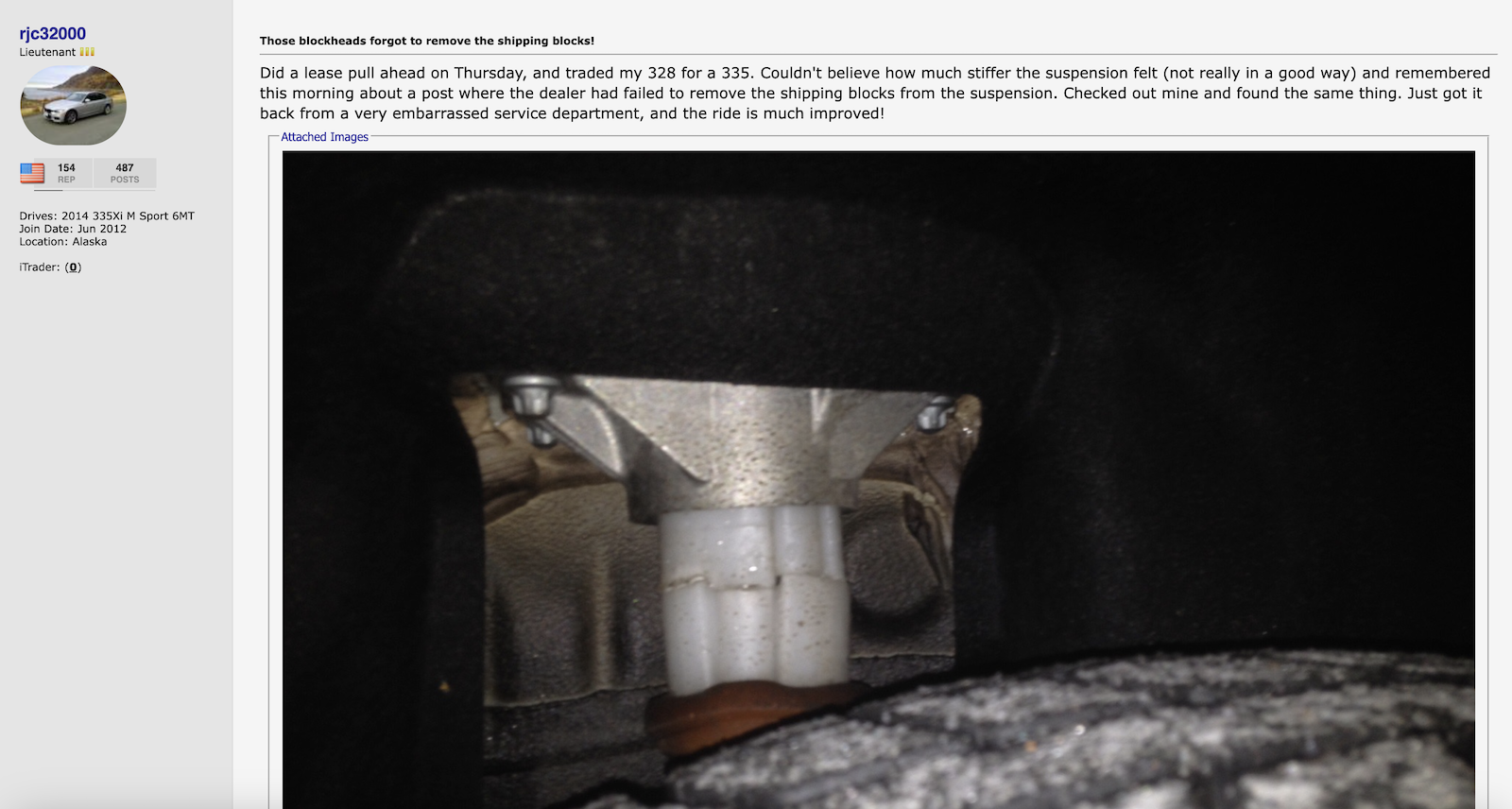
So what could happen if these blocks are left in? Well, these blocks intentionally reduce suspension travel, so they will make your car drive worse if they’re left in. You know the feeling when you go over a big enough road imperfection or compression to hit the bump stops? That’s going to happen sooner if someone forgot to take the shipping blocks out. Not only will leaving these blocks in affect ride quality, it could make things squirrely if you’re hustling it.
While the chances of still having transport blocks on your car are slim in the grand scheme of things as not every car comes with them, the next time your car’s up in the air, it may be worth taking a look to see if any temporary suspension hardware has been a little more permanent than intended.
Top graphic image: Reddit, eBay
Support our mission of championing car culture by becoming an Official Autopian Member.

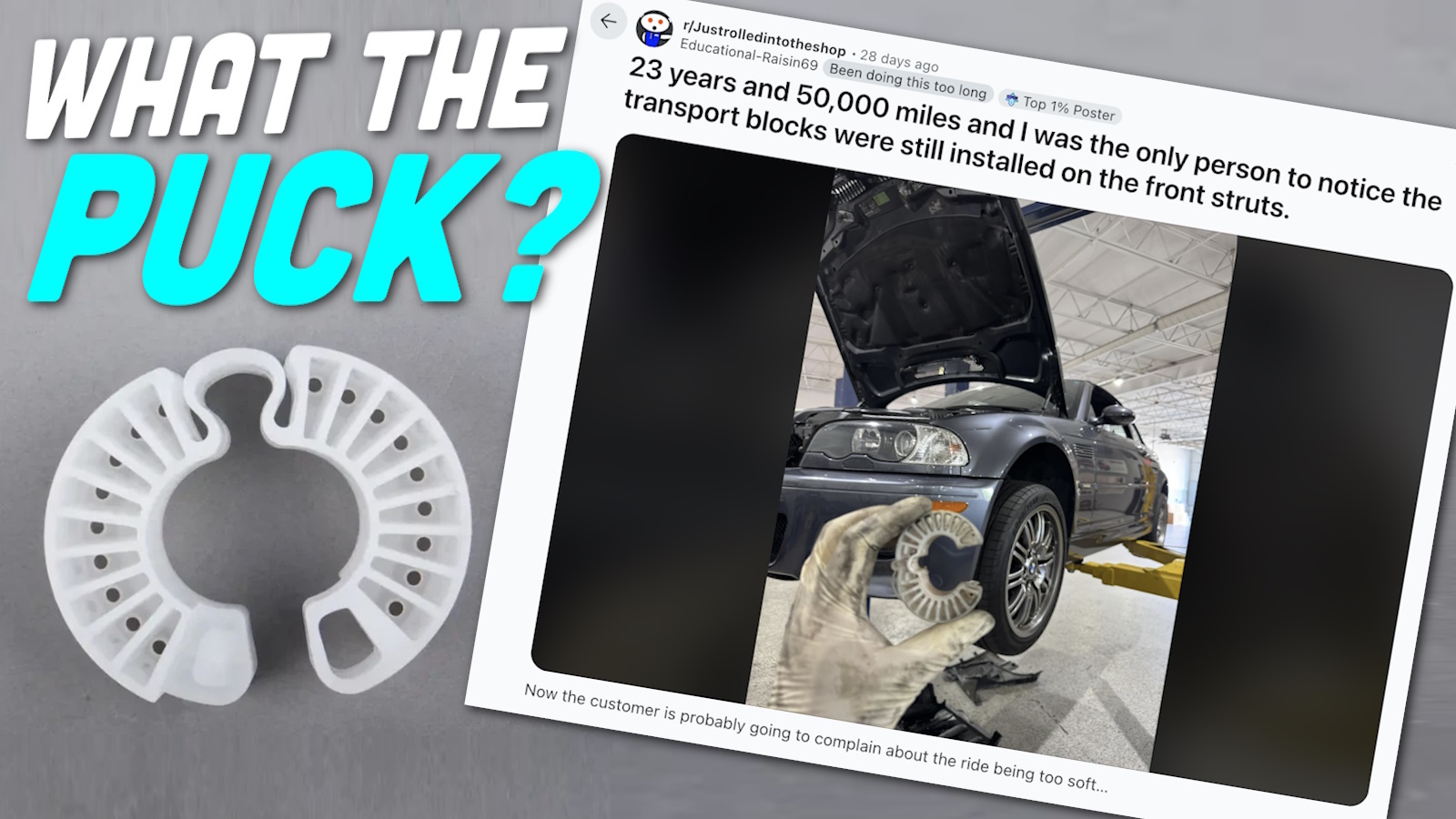







Parked next to a guy with these on a Jeep Liberty (I believe it was) a few years back. I was like, “hey, there’s shipping material on your car”, but, unfortunately, such a wonderful expositionary article was not available at the time.
Bunch of blockheads…ha ha
Kid I work with recently had his Corolla GR in for service, and at that point they noticed the blocks were still in.
He said it rode much nicer afterwards, he had thought the ride was a bit harsh, but he hadn’t had the opportunity to drive on before ordering his, so he didn’t know there was anything wrong.
I think I need my own PDI…I recently looked down at my car and realized I’d driven to work and back with one of my QuickJack pinch weld blocks still stuck to it. I’ve also left an oil filter wrench on the filter for several thousand miles (needed it for another car and wondered where the hell it could have gone). Oops.
I know someone with a dramatically stiffer Camry than normal.
Might be the cause unless someone put off shocks on it.
Steering is squirrelly too.
Meant odd shocks.
Autocorrect continues to get worse.
They chose the wrong color. Even bright yellow gets mistaken for an intentional accent. Just ask Dodge and their yellow bumper guards.
Honestly, they should have picked hot pink, with little hearts on them. Or more (uh) expressive icons. Something to make it glaringly obvious to the techs that it isn’t supposed to be there.
Or just take a page from aviation world and slap on a massive “REMOVE BEFORE SALE” red tag on it.
I never thought the “leave the yellow bumper guards” trend was a mistake, I assumed it was just people trying to make their cars look as stupid as possible, like with heavy stancing.
Funny thing about the “remove before sale” tag – GR Corollas have a window sticker calling out the shipping blocks that you’re supposed to remove as part of PDI along with the blocks, yet somehow people still ended up with the blocks not being taken out. Never question a human’s ability to ignore instructions.
Wow, I never even knew this was a thing before reading this article.
Gee, dealers are giving stuff away for free that the auto parts store charges you your hard earned money for, and people complain?
https://www.autozone.com/parts/suspension-steering-tire-and-wheel/coil-spring-booster
When we were going to overload the pickup with a couple tons of stuff, my dad would just stick a couple pieces of railroad tie between the rear axle and the frame. Of course that didn’t keep the frame from bending, but nothing a 60 ton jack and some chain couldn’t fix,
I know of a few speed bumps in Brooklyn that an easy to use temporary bump stop would be a godsend for,.
There are silicone shims that can be added to springs too.
So these are like those strips of yellow tape on the front of Dodge Challengers that people leave on for years?
At least the shipping blocks have the decency to hide from view.
Definitely was an issue on the Civic Type R’s per forum posts. The car rides very stiff, so it was one of the first things I checked and the dealer had removed them. I’ve since installed the Integra Type S damper module to soften the ride.
I don’t know about car dealerships, but at motorcycle dealerships, the bikes arrive in crates with some assembly still required. You might pay 1.5 hours of “Setup and Predelivery” at $150/hr for shop labor. So that’s a $225 charge on your invoice.
The sales department doesn’t pay that to the service department. What they do instead is hire a high school kid who can turn a wrench and pay him pennies to set up new bikes, and then they pass the savings onto themselves!
That was my first job. And it was pretty cool! My friends were flipping burgers for half my pay, and once in a while I got to test ride a CBR900RR.
That was my dad’s first job. Putting together new Yamahas back in the 70s.
“Skilled trades” my ass
If you buy a new car, how would you know how it’s supposed to ride? Hell, the reason we didn’t buy a Mazda 3 years ago was because my wife thought it was sluggish. Only after we left the dealership did I ascertain that she had the E-brake on for her test drive! I could totally see somebody being presented a car and just driving it broken because they didn’t know it was broken.
An excellent question is why anyone thinks hidden, counter intuitive emergency brakes are a good idea, even on trucks!
Well, one of those two things would end up with a red “BRAKE” MIL on at all times, one would not.
All the cars with electric parking brakes would lock the wheels if it was left engaged.
Most of them even release the parking brake automatically after you put it in Drive
Back in the late ’90s when I was in college I worked at a Ford dealer doing PDIs. On Tauruseses I remember we were required to remove rear tie down points that were bolted under the car and were visible from the rear, but I recall seeing plenty of them driving around with the tie down points still attached.
Those are rather handy.
If those bright yellow blocks came on Chargers and Challengers can you just imagine how many would still be installed intentionally?
Back in my day I tied an onion to my belt, as was the style at the time.
We sure get milage out of that bit. I’ve never heard it, but thanks to you guys, I know it by heart
Those are NOT transport blocks. They’re NASCAR-style spring rubbers, used to improve handling. You need to talk to your crew chief about those.
Only after you hit the pace car.
Because you hit every goddam other car.
At the age of the readers here shouldn’t that be the pacemaker car? JK
Hey now! My ticker works just fine, it was the tumor on my small intestine that they had to open me up for.
So maybe the gut wagon?
I got your spring rubber right here, buddy.
But how about my summer, winter, and fall rubber?
Wash and reuse, I’m afraid
Clothes washers have shipping blocks on them that require removal as well.
Yep I had a washer delivered and they did not remove the straps, brackets, and Styrofoam blocks. I did not think to look under something I payed people to install. I demanded and got an new washer replacement.
Makes a lot of sense.
Had a new washing machine walk across the floor because of those.
That’s been a big thing on the GR Corolla forums and FB groups.
(Also we have to tell some of them to not run 55-60# of air in the tires either.)
Holy ish! TK! I remember you from Yarisworld forums.
running into someone you know from another forum feels
like running into your teacher at the supermarket.
Recognized someone I met in the desert from a Lotus forum.
There was a guy at Cincy autocross who had been running his GR-C for months before he figured this out. The day I met him was the first autox without them. He mused that it was a totally different car.
I’m sure it was. ;^)
it is not PSI, it is %.
Tires need at leadt 90% of air in them
VW Jettas have/had florescent yellow pucks on the struts. Working at a fleet, and I could tell when they were still installed. I would drive into my bay, over the speed bump/rain block, and if I saw the ceiling of the shop, I knew exactly what the problem was.
Found these still on my SS after I got it home from the dealer.
If only all the other BMW plastic parts can last as long as that shipping block.
23 years and 50K miles, I think I am missing something. <2200 miles/year? I am sure I am missing something.
Not terribly uncommon on a “fun car” like an M3.
so sad, fun cars should be driven.
As much as I agree with this in theory, it’s hard.
If you’re a childless person or empty nester in a good climate, you have no excuse. But for those of us who spend months looking at cars in the garage when it’s cold and salty outside, or who carry kids with them on 80% of trips, it can be hard to make time.
So true. Fun cars and hobbies definitely take a back seat to little human needs.
Don’t do the crime if you can’t do the time.
Not quite clear what you’re implying here; are you saying I should regret having children because now I can only drive the Viper 2000 miles a year vs 5000 or whatever? Because I assure you I don’t and won’t.
I put 600 miles per year on my daily Wrangler since I bought my fun GTI. I just force myself to drive it to get fresh fuel into it twice a year.
GTI is way better at dailying than a Wrangler thought. Its heated seats, steering wheel, defroster win over 4WD every time.
Driving is not really that hard that you have to drive boring car more than the fun one
I put 900 miles on my BMW wagon last year. Haven’t put more than 2K on it in a year since I moved to FL going on nine years ago. Rather less than those numbers on my other two cars in Maine. I didn’t even register my Land Rover in 2024. Happens when you own a bunch of cars in two places.
I get through about 2-3000 miles per year, because I live in a big city and don’t need a car 95% of the time.
I call BS on that one, the dealer was 100% just saving face. I find it incredibly hard to believe that the PDI checklist would not include something as important and seemingly obvious like removing the shipping blocks on the springs. Dealers will be dealers I guess…
It probably isn’t explicitly stated, but there’s probably a section or line item referencing suspension inspection. Some dealers or franchises will use their own PDI sheets and things will not be spelled out like they should be. ¯\_(ツ)_/¯
Seems like the sort of thing you’d want explicitly stated. If it really wasn’t on there, a huge percentage of those cars are going to roll off the lot with them still on. A bunch will come back needing repairs for cracked rims, etc. Oh wait . . .
As I like to say, there are very few bad cars, but an awful lot of terrible dealer techs.
Yeah, this sounds like a pretty strong case for a refund of any PDI charges (because it obviously wasn’t properly done). Let me guess how far that argument would get…
Every service checklist has step to check tire air pressure and to set it to factory setting but every time its either 40 PSI or 32. Or whatever I set at home or whatever is there left after it leaked out
They just check the box and move on to the next thing without looking at the vehicle like everyone else with a check list to fill out
Oh yeah this is absolutely a possibility, a friend of a friend bought a brand new Prius, and dealer never lowered the tire pressures, which were around 50+ psi, but the TPMS never triggers for too high, only too low, which led to a blowout on the highway.